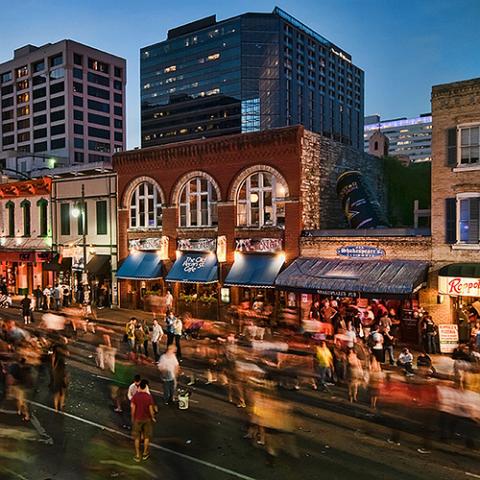Updated December 2015
Known as “The Live Music Capital of the World,” Austin is reported to have more music venues per capita than any other U.S. city. Besides being a cultural center, it’s also the state capital, a center for education, and the economic hub for a metropolitan area of over 1.7 million people. With a population of nearly 912,800 according to the U.S. Census Bureau’s 2014 estimates, Austin is the fourth largest city in Texas. It has experienced a population boom over the past several years—with a growth rate of nearly 16 percent between 2010 and 2014—and was ranked by Forbes as the second fastest growing city in 2015. The city’s racial composition is roughly 49 percent white, 35 percent Hispanic or Latino, 8 percent African-American, 6 percent Asian, and 3 percent of two or more races.
In 1928, the City Planning Commission’s “A City Plan for Austin, Texas” institutionalized racial segregation by explicitly recommending moving “the negro population” to East Austin, and, despite hotly contested gentrification struggles, the trend of residential segregation is still visible on the East side. During the “dot.com” boom of the 1990’s, East Austin’s proximity to downtown, low-cost real estate, and retreating social stigma attracted an affluent majority, which forced many of the poor minority households to leave. The decline of affordable housing in East Austin and other segments of the city prompted the formation of CDCs and, in 2007, the Homestead Preservation District was established to create a reinvestment zone, a community land trust, and land bank in East Austin.
Today, some of the city’s CDCs strive to incorporate environmental justice principles. One example is the Saldana Subdivision, an infill project of four tracts on 7.2 acres by Guadalupe CDC. Built with the goal of achieving net-zero energy for all units, the development will be affordable to moderate- and low-income homeowners and renters, with a large portion affordable for extremely low-income households. Austin has been recognized by the U.S. Department of Energy for its work in green development and due to an active green movement, stringent new energy efficiency codes have become standard practice for all new construction in the city.
Austin’s size and the dynamic role of community groups and approaches have catalyzed community wealth building efforts in recent decades. Groups such as the Independent Business Alliance Austin and BigAustin help encourage a strong network of independent, locally owned firms. In the two decades since its inception, PeopleFund, a local community development financial institution, has grown from the idea of one graduate student to possibly the most influential voice for community development in Central Texas with over $15 million in assets and many more millions in loans. Cooperation Texas, the only worker cooperative development center in the state, is also playing a critical role in catalyzing and supporting sustainable jobs by providing education, training, and technical assistance to people seeking to start or strengthen worker-owned cooperatives, and business owners interested in selling their enterprise to their workers.
An overview of community wealth building efforts follows:

